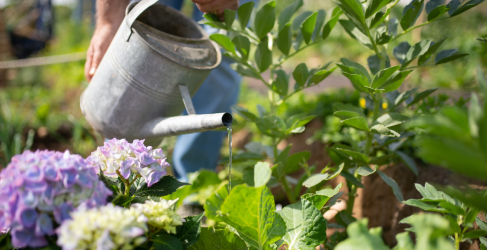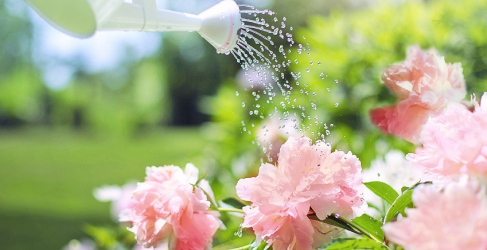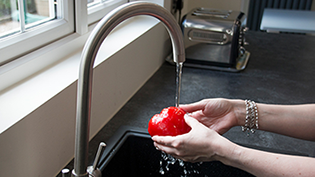BLOG: National Gardening Week - Julianne Robertson
06 May 2022“A small Scottish roof collects over 45,000 litres of water each year, which should help to keep a water butt topped up. ”
Julianne Robertson
Communications Technical Expert, Scottish Water
It's National Gardening Week and spring has finally sprung, so our thoughts are turning to our gardens again. In my last blog I provided some tips on how to prepare for the coming season by conserving water – and now that the weather is warming up, it’s becoming more important to know how to use that water wisely. Whether you love to grow colourful flowers, tasty fruit and veg, or simply want to keep the lawn looking neat, this is the time of year we become more mindful of watering. It can be an essential part of your garden routine, especially if you want to nurture young seedlings or newly-planted crops, but are you doing it right? I want to share with you some top tips for watering the right way, prioritising this precious resource for the plants that really need it and making the most of water in your garden.
What plants need water?
All plants need water, but some of them may not necessarily need you to provide it for them. Established shrubs, perennials (plants which die back and return every year) and hedges should have roots deep enough in the soil to be able to find moisture no matter how dry the conditions. Unless it's newly laid turf, your lawn doesn't need watering either, even when it turns brown. Grass is incredibly resilient and will bounce back to life quickly once it rains.
Instead, prioritise water for those plants which need it most, for example seedlings, cuttings, annual bedding plants, leafy vegetables (eg lettuce, spinach) or anything which is newly planted. Their roots are still developing or are naturally shallow, and it's important to make sure they have a steady supply of moisture. Other plants which tend to be quite thirsty are those in greenhouses or conservatories, especially tomatoes, cucumbers and peppers, and especially when they're developing fruit.
Water the right way
A water butt is an ideal source of water for any garden. Rainwater is better for plants as nitrogen in the rain helps plants thrive. A small Scottish roof collects over 45,000 litres of water each year, which should help to keep a water butt topped up. You can then fill a watering can and direct it straight into the soil and to the roots of your plants, there's no need to wet the leaves. Using a hose and spraying over a wide area is much less effective, and sprinklers are even more wasteful, using as much water in one hour as a family of four uses in a whole day!
Plants in pots need watering more often, but if you choose the right container this can help reduce the amount of watering needed. Larger containers will retain more moisture, as will plastic ones instead of terracotta. You can also get self-watering containers which are a great way of ensuring a steady supply of moisture to plants in a greenhouse, such as tomatoes, or houseplants which hate to dry out.
Mindful watering
During a particularly hot summer watering can seem like a never-ending task, with the soil drying out quickly every day, and you might end up spending a lot of time with a watering can in hand, trying to keep your precious plants alive. Instead of seeing it as a chore, take it as an opportunity to enjoy your garden as well as looking after your mental health. Watering can be a mindful moment - usually done in the early morning or late evening when it's cooler, it's a chance to get outside and find some headspace.
Take the time to slow down and enjoy the process of filling and emptying the watering can, checking the health of your plants and observing nature. There are many aspects of gardening which are good for our physical and mental health, including being mindful and paying attention to our surroundings. Not only that, but when we take steps to conserve water and use it wisely, we're also doing our bit to protect one of the planet's most precious resources.










